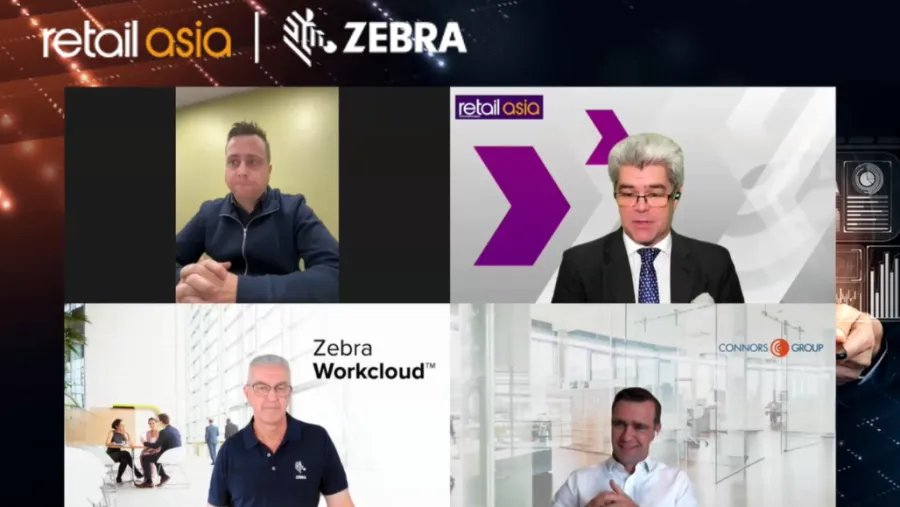
Building customer-centric stores: How innovation can help retailers overcome challenges
Discussions highlighted Zebra Technologies’ Workcloud suite, SaaS tools for creating customer-centric stores, and the role of AI in empowering retail workers.
Retailers have been grappling with significant challenges in recent years, such as optimising inventory, enhancing customer experience, and addressing workforce management issues. These necessitate innovative solutions and strategies to remain competitive and future-ready.
To address these issues, Retail Asia and Zebra Technologies hosted an insightful webinar titled "Shaping the Modern Store: Navigating Challenges with Innovation in Retail" on 30 May 2024. It featured expert insights from industry leaders including Darren Bretherton, Software Solutions Lead for Australia & New Zealand at Zebra Technologies; Josh Cunningham, Product Owner (Voice Network) at Woolworths Group; and Robert Eichfeld, Director at Connors Group.
To highlight Zebra Technologies’ capabilities in addressing the said challenges, Bretherton presented Zebra Workcloud, a comprehensive enterprise suite designed specifically for retail.
Bretherton explained the four key pillars of Workcloud — workforce optimisation, enterprise collaboration, demand intelligence, and inventory optimisation — whilst providing a look at the Workcloud timekeeping and scheduling solution, which integrates artificial intelligence (AI) and machine learning for demand forecasting and complex scheduling.
“Our strategic products can help provide certainty in uncertain times and lower costs in a time of high cost of living,” he said.
Bretherton also delved into Zebra’s “The Modern Store” framework, which emphasises the use of technology to enhance efficiency, customer experience, and overall business performance.
Creating customer-centric stores
During the discussion, the three industry leaders explored the benefits of SaaS-based tools to retailers and how they pave the way to creating customer-centric stores.
Cunningham specifically looked at the use of physical hardware solutions across many retailers but noted the limitations that such hardware solutions pose. He noted that a SaaS model allows users to use any single device to do their jobs.
“The big thing around SaaS is the standards, design, and flexibility that it gives back to our team members, which has been the cornerstone of the results. That's also effectively enabled us to reduce the total amount of devices that our team members need to carry,” he explained.
In addition to this, Eichfeld highlighted the capability of SaaS tools to handle large amounts of data. “They provide a lot of data and analytics that you can use further in your business to really identify your customers, track your customers for different parts of your organisation, and tailor your offerings,” he said.
Eichfeld also gave retailers some recommendations on approaching the integration of new technologies into their existing infrastructure. “Technology is always exciting and shiny. It's really [about] understanding how that influences your process in the business and what you need to change,” he said. In addition, he highlighted the need to have “champions” who will carry the message and introduce any new technologies that are being integrated into a business.
“Retail is always changing and always full of challenges. The good news is there are always solutions out there. The key is to understand your problem, define your problem, understand first how you need to change, pick the right solution for you, and then make it happen,” he said.
Cunningham concurred, emphasising that any type of innovation or transformation that a company embarks on must focus on the current state of the business as a baseline. From there, retailers can measure and identify areas of improvement that reduce operational complexity.
“This will help you realise improvement to your service through planning some strategic initiatives around these capabilities and navigating how we can start to provide retail-ready solutions to team members,” Cunningham said.
Participants in the webinar were likewise able to join the discussion and ask questions for the panellists, allowing them to weigh in on the emergence of RFID in retail. Whilst RFID is an emerging trend and costs related to it have gone down in recent years, it is important to note that using any new technology depends on the particulars of a business. As such, RFID and other new technologies would only make sense in areas where margins allow them.
Technology and retail workers
Moving on to AI in shaping modern stores, Bretherton underscored how Zebra sees AI in retail as a “big enabler” for frontline workers, providing equal access to key product information and empowering them to become experts instantly. “As AI and automation take over routine tasks, employees are able to focus more on complex tasks and strategic roles,” he said.
More than the technology, both Cunningham and Eichfeld spotlighted the need to understand the customer’s needs, especially since they will be the ones to use the technology and determine a company’s return on investment.
“The customer, they're the gold right there; they're the cornerstone,” Cunningham stressed. “Understand what their pain points are and build that into your measurements because from there, you'll get the insights and the goal is you need to build a capability that will suit them.”
Did you miss the webinar? Catch up through the on-demand event recap to gain a deeper understanding of how to address workforce challenges.



















 Advertise
Advertise






